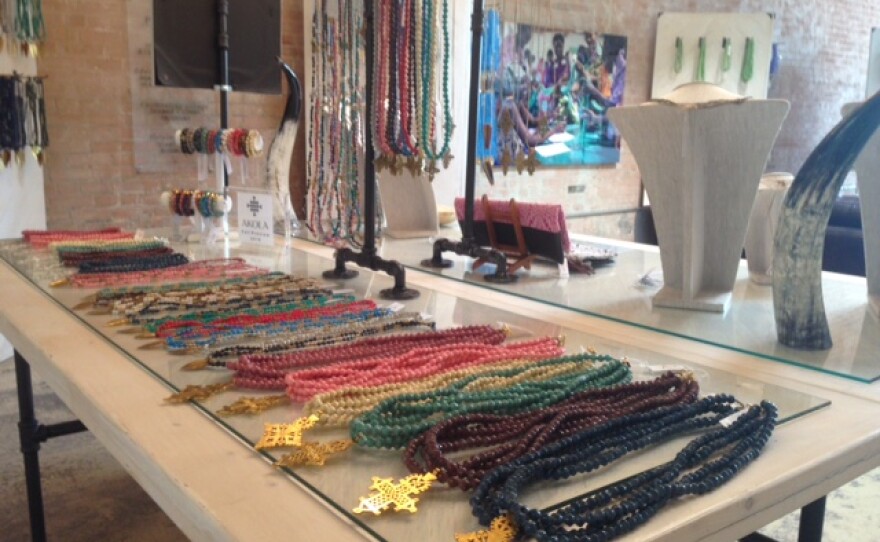A North Texas program designed to help marginalized women secure meaningful employment also hopes to empower women. The Akola Project says that starts with a job that pays a living wage.
Akola Project jewelry is not your typical accessory. Vividly colored, the long bead necklaces are made of scrap materials-- metal discs, melted glass, bone and cow horn.
Four hundred women in Uganda work on the project-- carving the pieces and hand rolling the paper beads
Each of them care, on average, for seven children and three elderly adults.
“These women are subsistence farmers and don’t own their own land so one bad harvest and their children starve and then they’re in debt to the local land owner," says founder and CEO Brittany Underwood.
The Start Of A Journey
Underwood launched this program after teaching at a Ugandan boarding school when she was still in college at Southern Methodist University. In Africa, she met Sarah, a poor woman caring for 24 street kids, even though she barely had enough to feed herself.
By the time Underwood graduated from SMU in 2006, she’d raised enough money to build a three-story orphanage in Uganda, with room for 180 children. She moved there to oversee the project and found women there, just really needed an income.
That's how the jewelry project was born. It started small but quickly grew—at last count 450 stores in the U.S. sell Akola Jewelry.
Expanding To Help Women At Home
When Underwood decided to expand the project-- creating jobs for poor women in Dallas-- she quickly figured out that the jewelry wasn’t priced high enough to pay North Texas workers a living wage.
So she approached Neiman Marcus about carrying a high-end line, featuring gem stones. Neiman’s said yes.
“They let us know that they were launching us nationwide in every store, online, in their catalog, so overnight we were able to onboard 100 women here in Dallas," she says.
Many of the Dallas women who assemble the Neiman Marcus collection and work in distribution are battling things like a criminal history or drug addiction. Their salary is $15 an hour.
“I’m able to be self-sufficient, I’m more responsible with my money," says employee Annette Bailey. "And I know I can supply all of my needs, and also some of my wants.”
A Second Chance
Bailey started working with Akola two years ago, as part of a second chance job program. She’s a permanent, full time employee now. Before, she struggled with substance abuse and worked in prostitution and had no luck finding a job that paid more than minimum wage.
“When you have a felony nobody really wants to even mess with you, you know, and it’s hard for you as a woman really to even be trusted again to step out in the world after you have been labeled as a prostitute," she says.
That label no longer applies. Bailey handles customer service and pricing-- taking orders and receiving shipments. At 57 years old she’s a professional with dreams of one day becoming a substance abuse counselor.
“Everybody can change, and start over anew," she says. "But somebody's got to be willing to give you a chance, a second chance in life.”
The Akola Project was willing, and hopes to be in the business of second chances in North Texas and far beyond, for years to come.









